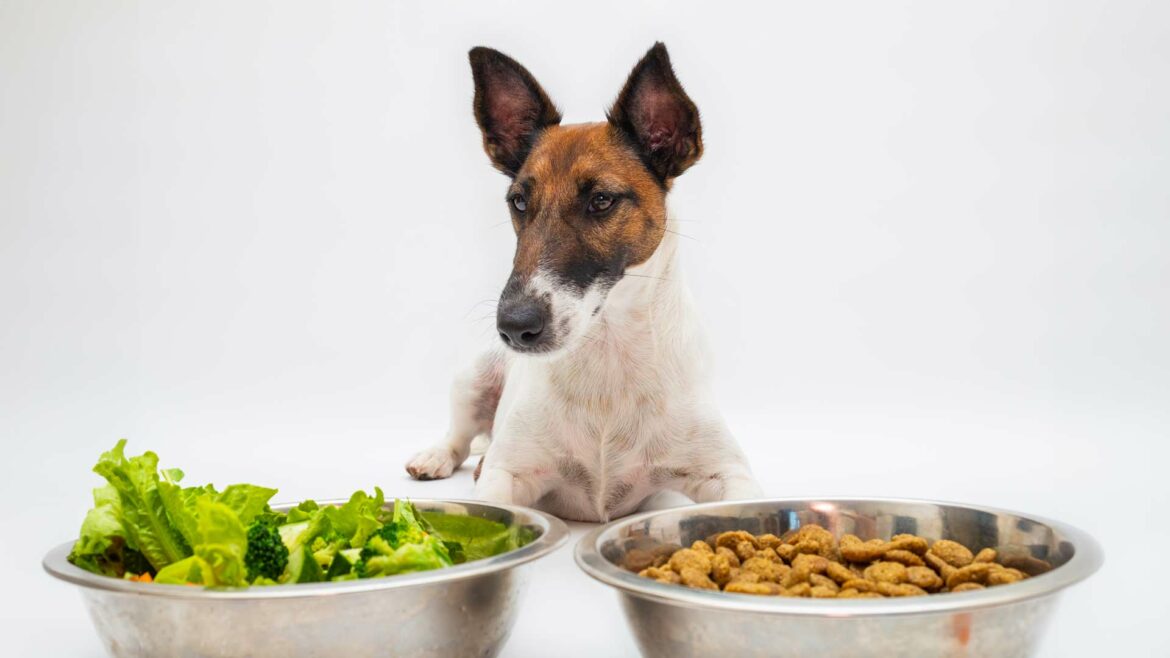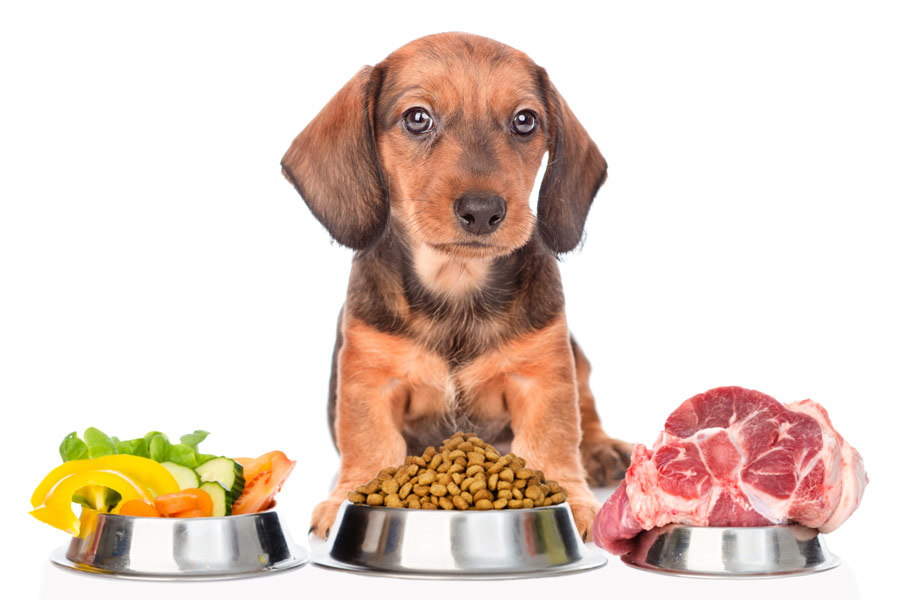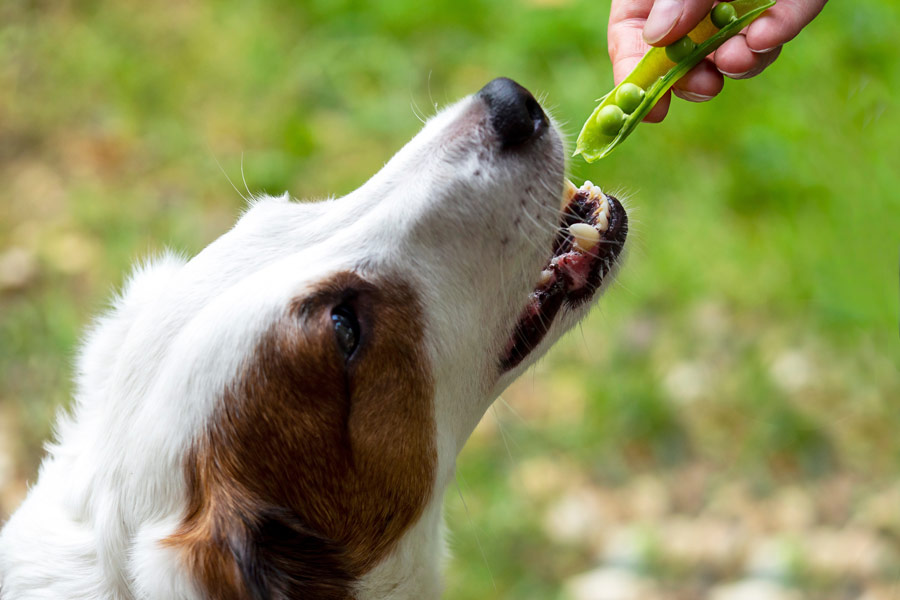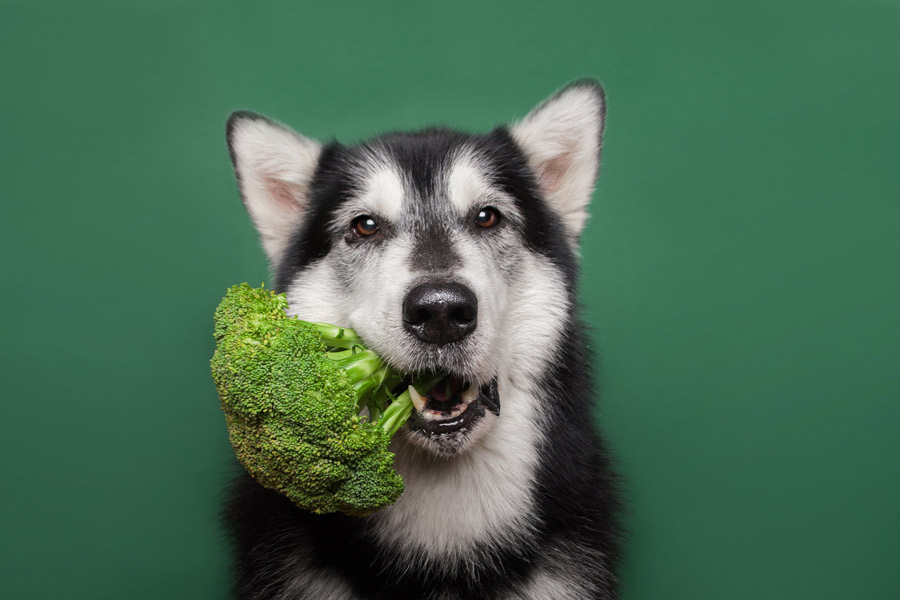
The nutrition of our furry friends is a topic as important as delicate. There are many different types of dog food: dry, wet, more nutritious, more digestible…
Understanding which food is more suitable for our dog is not an easy task. We also have to consider the increasing spread, in the last few years, of different eating styles such as vegetarian and vegan diets: several owners wondered if their four-legged heart could be vegan.
Let’s try to find out something more to clarify this topic!

Which diet to choose for your dog?
Dog’s natural diet
In the past the wild ancestors of dogs, currently known as domestic pets, have evolved in a slow and gradual process, but some nutritional needs remain unvaried. Historical descendant of wolves, dogs used to hunt in packs and to feed themselves mainly – if not exclusively – with meat. But later, their eating habits branched out, as result of man domestication and selection which began thousands of years ago.
Actually, according to the most accredited theory of domestication, that is to say the one formulated by the Coppinger spouses, it is hypothesized that dogs come from more docile wolves that approached human settlements and fed themselves with their leftovers composed mainly of food or waste. The dog was therefore born as garbage collector! (you’re thinking of your four-legged glutton, isn’t it?)
Starting from here, thanks to the domestication process, dog’s eating habits have also changed based on the influence of humans who led dogs to a genetic and physical variation as compared to wolves. About dogs’ evolution, nowadays we can see that dogs have a better digestive and assimilation system of starch than wolves. We can therefore say that the substantial difference compared to their ancestors is that: wolves are forced to be carnivore while for dogs is an optional choice.
So, can we say that our dogs are ready for a vegan diet?
The importance of meat in dog’s diet
Meat is for animals a complex source of proteins, minerals and amino acids essential for their good health. Additionally, the fats of meat sources are fundamental for proper brain and muscle function. Eliminating meat from the diet is possible, but it requires to take great care to the nutritional needs of our furry friend.
Actually, dogs have complex food requirements that include:
- Macronutrients such as proteins, fats and carbohydrates: it is essential to remember that dogs, like humans, need a balanced intake of proteins, fats and carbohydrates for optimal health. Proteins promote muscle growth and repair, fats provide energy, and carbohydrates offer vital fiber and other nutrients. The challenge is to ensure that these macronutrients are adequately supplied in a vegan diet;
- Essential vitamins and minerals for dogs: calcium for bones, iron for blood, magnesium for muscle function. These nutrients are just the tip of the iceberg when considering dogs’ needs. In a meat-based diet, many of these minerals are easily available. In a vegan diet, however, ensuring their adequate intake requires an accurate planning;
- Amino acids and taurine: taurine, an amino acid abundantly present in meat – or anyway in meat-based dog foods, is often highlighted in debates about vegan diets for dogs. It is essential for eyes, heart and immune system health. Some plants contain taurine but in almost negligible quantities, which raises concerns about the intake of this nutrient when the dog follows a vegan diet.
Challenges and risks of a vegan diet for dogs
Now that we clarified the energy and nutritional needs of our trusted four-legged friends, let’s find out which are the possible obstacles we can face when choosing a vegan diet for our dog, and how to overcome them.
Let’s find it out.
Getting adequate protein sources
Finding alternative protein sources is the main challenge. Legumes, beans and some grains may offer proteins, but the quality and amino acid profile may differ from meat sources. Ensuring that dogs receive all the essential amino acids, in the right proportions, can therefore be difficult, but not impossible to achieve.
Make sure essential nutrients never lack
A well-planned vegan diet can potentially satisfy dogs’ nutritional needs, but let’s always pay close attention to their health. The lack of nutrients can in fact lead to health complications such as weight loss and anorexia, mood changes, skin irritations, ruffled hair as well as much more serious pathologies due to nutritional deficiencies (rickets, dermatitis and osteomalacia). In this regard, remember that for a good coat it is important not only to follow a healthy and balanced diet, but also to take constant care of his fur which is another fundamental aspect for his health. On Yuup! website you will find the best products with natural ingredients for the care and the well-being of your furry friends.
Digestion problems
Dogs have a shorter digestive tract than humans, designed to efficiently process meat. A sudden intake of only plant substances could cause digestive disorders. Our recommendation is to switch to a vegan diet in a slow and conscious way, starting by mixing small quantities of vegan food in the current diet and then increasing the proportion in a few weeks to let his body adapt to the new eating habit.

A gradual approach for the transition to a vegan diet is critical for his health.
Less appealing diet
Dogs have their own tastes too!
In fact, some may find a vegan diet not as appealing as a meat-based diet. In this case, it will be important to know how to identify his favorite vegan foods, without immediately forcing the new eating style.
Long-term health impact
Vegan diet long-term effects on our four-legged friends’ health are not yet fully known. Although some studies have shown that a vegan diet is associated with better dog health, proofs aren’t enough to declare for sure the superiority in terms of benefits of the vegan diet over the carnivore one.
How to switch to a vegan diet
Changing your dog’s diet, if managed correctly and consciously, certainly has no contraindications. That’s why a few steps will be necessary for a safe transition to a vegan diet:
-
Rely on experts: professionals, such as nutritionists who are experts in animal diets, are exactly what you need if you are thinking about adopting a new eating style for your dog that is free of meat and derivatives. They will be able to suggest you the best methods and times of the new diet;
• Monitor his health: keep an eye on the quality of his coat, bowel movements, behavior and his general health. Any sudden negative changes could indicate that the diet is not right for them. Even in this case, relying on a professional is a necessary aspect. A periodic vet check-up, especially in the earliest months of the transition to the new diet, will be important to ensure that the dog is not experiencing any problems;
• Consider supplements: even with the best vegan dog foods, your trusty companion may not be able to get all the essential nutrients. Consider adding supplements to his diet, to ensure he receives everything he may need, without forgetting to always seek professional advice.

With patience and perseverance your dog will get used to his new diet free of meat and derivatives.
Quindi, è possibile per un cane seguire una dieta vegana?
So, is it possible for a dog to follow a vegan diet?
The answer is yes: keeping in mind some keywords such as relying on experts, undertaking a gradual approach when switching to the new diet and obviously monitoring his health, with these measures you will see that even with a new eating style your dog will continue to be happy and in good shape!
Article written with the consultancy of Chiara Festelli, Dog Trainer.







